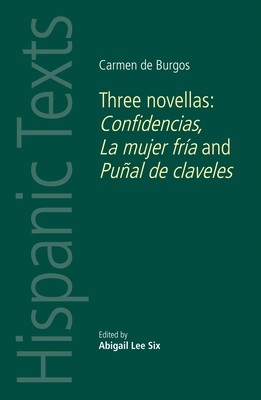
- We will send in 10–14 business days.
- Publisher: Manchester University Press
- ISBN-10: 0719097118
- ISBN-13: 9780719097119
- Format: 12.9 x 19.8 x 0.9 cm, softcover
- Language: English, Ispanų
- SAVE -10% with code: EXTRA
Carmen de Burgos (e-book) (used book) | bookbook.eu
Reviews
Description
This is a scholarly edition of three stories by Carmen de Burgos (1867-1932), also known by her pen-name of 'Colombine'. De Burgos was an influential journalist, socio-political activist and key literary figure in the cultural ferment of pre-war Madrid and is currently being rediscovered, having languished in relative oblivion during the Franco years. The stories are individually interesting and entertaining but together provide a varied collection, with some of the issues closest to Colombine's heart tackled from different perspectives. This adds up to a coherent critique of marriage conventions, women's poor education and prevailing ideals of femininity. The book includes the unabridged texts of the stories, vocabulary, notes, chronology, bibliography, 'temas de debate y discusión', and a critical introduction. Confidencias (1920) is the fictional diary of a young married woman describing her first adulterous relationship and exploiting the narratological possibilities of the diary form. La mujer frÃa (1922) is a vampire story featuring perhaps the first pitiable vampire, or at least one of the earliest examples of this type, whilst ingeniously maintaining uncertainty as to whether the protagonist is supernatural. Puñal de claveles (1931) narrates a wedding-day elopement and was inspired by a news item, the so-called 'Crimen de NÃjar' of 1928. Federico GarcÃa Lorca drew on de Burgos's story and the real-life crime for his Bodas de sangre, but while his play is tragic, Puñal is bathed in a golden glow of nostalgia for the author's native Andalusia and ends optimistically. This collection will be of interest to students and scholars of Spanish literature and modern literary studies.
EXTRA 10 % discount with code: EXTRA
The promotion ends in 7d.16:20:15
The discount code is valid when purchasing from 10 €. Discounts do not stack.
- Publisher: Manchester University Press
- ISBN-10: 0719097118
- ISBN-13: 9780719097119
- Format: 12.9 x 19.8 x 0.9 cm, softcover
- Language: English, Ispanų English, Ispanų
This is a scholarly edition of three stories by Carmen de Burgos (1867-1932), also known by her pen-name of 'Colombine'. De Burgos was an influential journalist, socio-political activist and key literary figure in the cultural ferment of pre-war Madrid and is currently being rediscovered, having languished in relative oblivion during the Franco years. The stories are individually interesting and entertaining but together provide a varied collection, with some of the issues closest to Colombine's heart tackled from different perspectives. This adds up to a coherent critique of marriage conventions, women's poor education and prevailing ideals of femininity. The book includes the unabridged texts of the stories, vocabulary, notes, chronology, bibliography, 'temas de debate y discusión', and a critical introduction. Confidencias (1920) is the fictional diary of a young married woman describing her first adulterous relationship and exploiting the narratological possibilities of the diary form. La mujer frÃa (1922) is a vampire story featuring perhaps the first pitiable vampire, or at least one of the earliest examples of this type, whilst ingeniously maintaining uncertainty as to whether the protagonist is supernatural. Puñal de claveles (1931) narrates a wedding-day elopement and was inspired by a news item, the so-called 'Crimen de NÃjar' of 1928. Federico GarcÃa Lorca drew on de Burgos's story and the real-life crime for his Bodas de sangre, but while his play is tragic, Puñal is bathed in a golden glow of nostalgia for the author's native Andalusia and ends optimistically. This collection will be of interest to students and scholars of Spanish literature and modern literary studies.


Reviews